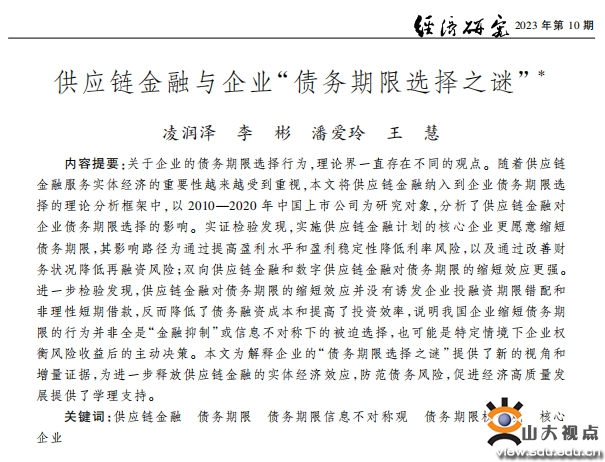Recently, “Supply Chain Finance and Corporate Debt Maturity Choice”, a collaborative work of Professors Pan Ailing and Li Bin, Doctoral Student Wang Hui from the School of Management of Shandong University, and Postdoctoral Fellow Ling Runze from the Business School of the Renmin University of China, has been published in the top journal of Economics and Management, Economic Research Journal, Issue 10, 2023. Professor Pan is the corresponding author, Postdoctoral Fellow Ling is the first author, and Shandong University is the only corresponding author affiliation.

The study is based on the following background: under the growth model of “debt-driven investment”, the debt scale of China’s real enterprises continues to climb, the phenomenon of debt short-termism is obvious, and the debt risk is accumulating. Reasonable arrangement of debt maturity can prevent systematic investment and financing maturity mismatch at the enterprise level, which is the micro-foundation of preventing debt risk and systemic financial risk. However, high-risk behaviors such as “short-term lending and long-term investment” are common in enterprise practice. Theoretically, there have been “information asymmetry view” and “trade-off view” on the choice of debt maturity of enterprises, which makes it impossible to judge the choice reasonableness of enterprises debt maturity in theory. In order to solve the “mystery of corporate debt maturity choice” that has existed in theory and practice, the study explores the behavior and economic consequences of corporate debt maturity choice under the influence of supply chain finance based on the new situation that enterprises implement the supply chain finance strategy.
Based on the data of listed companies, the study finds that enterprises which implement the supply chain finance strategy are more willing to shorten the debt maturity, and its influence path is to reduce the interest rate risk by improving the profitability and profit stability and to reduce the refinancing risk by improving the financial status; the two-way supply chain finance and digital supply chain finance have a more powerful effect on debt maturity shortening. The effect of supply chain finance on debt maturity reduction does not induce investment and financing maturity mismatch and irrational short-term borrowing, but reduces debt financing costs and improves investment efficiency. The results of the study suggest that the shortening of debt maturity by Chinese enterprises is not always a forced choice under “financial inhibition” or information asymmetry, nor does it exacerbate investment and financing maturity mismatches to increase debt risk, but may be a market-based choice to maximize enterprise value after weighing the costs and benefits.
The study results provide new perspectives and incremental evidence to explain the “mystery of debt maturity choice” of enterprises and provide theoretical support for further releasing the real economy effect of supply chain finance, preventing debt risk, and promoting the high-quality development of the economy.
Pan Ailing, Professor of the School, Selected Candidate for the National Ten Thousand Talents Program, and Distinguished Professor of Taishan Scholars, has presided over a total of more than 30 programs, including Major Programs and Key Programs of the National Social Science Fund of China, provincial programs, ministerial programs, etc. Her main research areas are mergers and acquisitions and reorganizations, group finance, and investment and financing in the cultural industry, etc. She has published more than 100 papers in journals including Economic Research Journal, China Industrial Economics, Nankai Business Review, Accounting Research, Pacific-Basin Finance Journal, etc., many of which have been reprinted by Renda Periodicals or extracted from the arguments of Xinhua Digest. The relevant results have been selected in the National Achievements Library of Philosophy and Social Sciences and won the first prize of the Major Achievement Award of Shandong Provincial Social Science Outstanding Achievements.
Li Bin is the Professor of the School, Director of the Accounting Department, and Shandong Accounting Talent (Academic). His main research areas include corporate mergers and acquisitions, financial governance, and green finance. He has presided over more than 10 programs, including Programs of the National Natural Science Foundation of China, the National Social Science Fund of China, and Humanities and Social Science Projects of the Ministry of Education. As a sub-topic leader, he has completed one Major Program of the National Social Science Fund of China and several provincial and ministerial level projects. He has published more than 30 papers in China Industrial Economics, Nankai Business Review, Business & Society, Australian Journal of Management, and 3 monographs. His research results have won the second prize of the Major Achievement Award of Shandong Provincial Social Science Outstanding Achievements.
Link: https://mp.weixin.qq.com/s/19SwW-D1U_1si6OPUBtixA